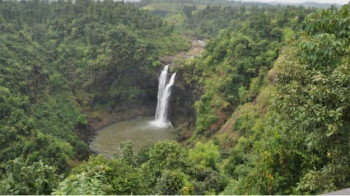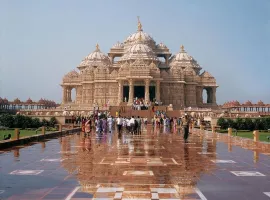Pashupati Nagar
Mirik . West Bengal . India
Duration
2 to 3 Days
2 to 3 Days
Best time to visit
Sep-Dec
Sep-Dec
Theme
Religious
Religious
Pashupati Nagar Travel Guide
Pashupati Nagar is a charming town located in the Mechi Zone of eastern Nepal, near the border with India. This town holds significant historical and cultural importance as it is home to the revered Pashupatinath Temple, a sacred Hindu temple dedicated to Lord Shiva. The town is also known for its picturesque landscapes, with the majestic Himalayas providing a stunning backdrop. Pashupati Nagar is famous for being a pilgrimage site for Hindus and a gateway to the beautiful hill stations of Nepal.Top Attractions in Pashupati Nagar
- Pashupatinath Temple
- Koshi Tappu Wildlife Reserve
- Ilam Tea Gardens
- Mirik Lake
- Sandakphu Trek
Pashupati Nagar is Famous for
Tea Gardens and Himalayan views.Top Attractions in Pashupati Nagar
- Explore the mystical Pashupatinath Temple
- Enjoy a safari at Koshi Tappu Wildlife Reserve
- Stroll through the lush Ilam Tea Gardens
- Boat ride on the serene Mirik Lake
- Trek to Sandakphu for breathtaking views
What's Great about Travelling to Pashupati Nagar?
- Peaceful and spiritual atmosphere
- Rich cultural heritage
- Breathtaking views of the Himalayas
What's Not So Great about Travelling to Pashupati Nagar?
- Limited accommodation options
- Remote location may require long travel times
- Language barrier for non-Nepali speakers
Travel Tips for Pashupati Nagar
- Check visa requirements before traveling
- Use local transportation for an authentic experience
- Respect local customs and traditions
Important Pashupati Nagar trip information
- Ideal Duration: 3-4 days to explore the main attractions
- Best Time to Visit: Spring and autumn for pleasant weather
- Nearby Airports and Railway Stations: The nearest airport is Bhadrapur Airport, and the closest railway station is New Jalpaiguri in India
Per Person
10,789
*EXCLUDING APPLICABLE TAXES 4.9 Ratings
( 200 Reviews )
( 200 Reviews )
Per Person
26,672
*EXCLUDING APPLICABLE TAXES FAQ's on Pashupati Nagar
Q1: What is the best time to visit Pashupati Nagar?
The best time to visit Pashupati Nagar is during the spring months of March to May and the autumn months of September to November when the weather is pleasant, and the skies are clear. These periods offer ideal conditions for exploring the city, attending festivals, and enjoying outdoor activities. However, if you are a trekking enthusiast, the fall season is particularly recommended for clear mountain views.
Q2: Do I need a visa to travel to Pashupati Nagar?
for Pashupati Nagar vary depending on your nationality. Most visitors will need a visa to enter the country, which can be obtained upon arrival at the airport or applied for in advance at the nearest consulate or embassy. Exceptions apply to certain countries with visa-free agreements. It is advisable to check the latest visa information before your trip.
Q3: What are the must-visit attractions in Pashupati Nagar?
Pashupati Nagar boasts a wealth of attractions, including the iconic Pashupatinath Temple, Swayambhunath Stupa, Durbar Square, and the scenic Pokhara Valley. Nature lovers can explore the Annapurna Mountain Range or go on a wildlife safari in Chitwan National Park. For a cultural experience, visit Bhaktapur or Patan for their ancient architecture and vibrant markets.
Q4: Is Pashupati Nagar a safe place to travel?
Pashupati Nagar is generally considered safe for travelers. However, it is advisable to exercise caution in crowded areas, be mindful of your belongings, and avoid walking alone at night. Certain regions near the border areas may have travel advisories due to political issues, so it's recommended to stay informed before traveling to those areas.
Q5: What is the local currency in Pashupati Nagar and can I use credit cards?
The local currency in Pashupati Nagar is the Nepalese Rupee (NPR). While credit cards are accepted in larger establishments like hotels and upscale restaurants, it is advisable to carry cash for smaller vendors and local markets. ATMs are widely available in urban areas for convenient currency exchange.
Q6: What is the local cuisine like in Pashupati Nagar?
is a delightful mix of flavors influenced by Indian, Tibetan, and Chinese culinary traditions. Must-try dishes include momos (dumplings), dal bhat (rice and lentils), and Newari cuisine like chatamari and bara. Vegetarian and non-vegetarian options are widely available, catering to various dietary preferences. Be sure to sample local teas like chiya and try street food for an authentic experience.
Q7: What transportation options are available in Pashupati Nagar?
Transportation in Pashupati Nagar ranges from public buses and taxis to rickshaws and motorcycle rentals. For longer distances, tourist buses and private cars are popular choices. In urban areas like Kathmandu and Pokhara, you can also use ride-sharing apps for convenience. Trekking enthusiasts can opt for guided tours or rent mountain bikes for exploring the scenic trails.
Q8: Are there any cultural norms or etiquette I should be aware of when visiting Pashupati Nagar?
When visiting Pashupati Nagar, it is important to respect the local customs and traditions. Remove your shoes before entering temples and religious sites, dress modestly, and ask for permission before taking someone's photograph. Greeting people with "Namaste" is a sign of respect, and it is customary to use your right hand for giving and receiving items. Always be mindful of local beliefs and practices to ensure a positive cultural exchange.
Q9: I am a travel agent. How can I buy travel leads of Pashupati Nagar?
Register yourself as a travel agent at agents.tripclap.com and then you can buy travel leads to Pashupati Nagar once your account is approved. For more details contact our support team at +91-8069186564 or support@tripclap.com


